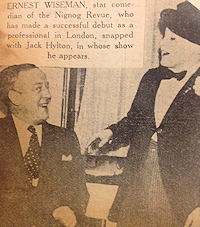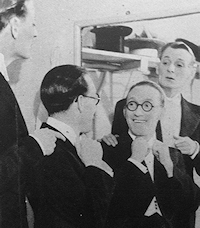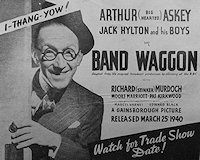Band Waggon - cont..
Feature from 2012

Ernie and Jack in 1939

Arthur and Stinker

Band Wagon - the film
It was during one of Hylton’s talent spotting trips that he happened to see a group of people from Lancashire and Cheshire that had won their local heats organised by the Melody Maker; the prize being an audition. Amongst the accordion players, singers and dancers was a young, gangly comedian called Eric Bartholomew.
Hylton liked what he saw and brought Eric into
Youth Takes A Bow with the first documented performance including both Eric and Ernie being the first week of June 1940. The reviews now gave equal space to the main stars of the youth show, not only Eric and Ernie but several others that became stalwarts of the show; Jean Bamforth (who later formed a triple act with the boys) and Mary Naylor. Also amongst the names was a certain Arthur Tolcher – You may have heard of him.
At its height, as usual, things started to fall apart. There were rumours that the BBC wanted to pull the radio show and Stinker was taken to hospital with appendicitis. The touring show was still breaking records across the country and despite the rumours, Hylton was adamant his show would continue. The problem was, the stars were only on loan.
The BBC did the unthinkable and the final radio show (for now) was broadcast on 16th March 1939, with the public up in arms over the decision. For Hylton this was a blessing, especially when the BBC allowed him to continue using Arthur and Stinker. The public, hungry for more, went to the theatres in their thousands, which opened up Ernie to whole new audience.
Around April 1939, Hylton announced that he was taking the show and making it into a film, using the original radio cast. This would allow listeners to catch up on the antics as the film would start where the radio left off. The production would start, claimed Hylton, on May 1st and continue for approximately six weeks. During this period the touring show would take a rest.
Despite this statement, the film never got started and the show continued its trek around the UK. There were still rumours of a film in June the same year, with neither Hylton nor Askey making comment when asked. It finally got the green light later that years and filming started on the roof of Shepherds Bush studios on Monday 24th August 1939.
Things were looking up, but we all know what was looming, and the outbreak of war disrupted both the film and the touring show. With theatres closing and staff not available, the BBC brought back the radio show in a nationwide effort to boost morale.
Filming continued when possible and eventually the final day of production was announced in the press, with incredible detail. The filming was complete; it was announced, at 1:30pm on Wednesday 11th October.
From then on, it was back on the road for Ernie and the rest of the team, back to the slog of continual touring. Ernie was still getting good reviews although some newspapers were a little behind the rest of us; announcing that there is a ‘promising newcomer’ in a January 1940 review.
A major change to the show came about because of Arthur’s fame and the demand for his talents in other areas. Pantomime season and of course his contract with the BBC meant he was not available from Christmas 1939 onwards and so a replacement had to be found.
This came in the unlikely shape of Max Wall. A good up and coming comedian with a wonderful talent for physical humour. He was not used as a direct replacement, Hylton rightly thought this would be a mistake, instead he played his own character and despite initial worries from the fans, he soon settled into the role.
Ernie was now touring and learning from Max, and continued to do so until the show ended around June 1940. Max continued his role until Arthur became free again, re-joined the cast in May of the same year.
Youth Takes A Bow continued to tour for several more years on its own, giving Eric and Ernie more exposure to other acts and more opportunity to get their names known. Talking of names, there was a very important moment during 1941, as the show toured with Adelaide Hall, a well-known singer.
Up until mid-July, Eric had been billed as Eric Bartholomew, but suddenly his named changed to simply Bartholomew, and there are several newspaper reviews stating this. Then he changed again, this time to just Morecambe – without the Eric. Eventually he settled on the full Eric Morecambe around August 1941.
These early days of the Young Ernie’s life were an education, with Hylton putting him alongside the experienced talent of Askey and Wall. It must have had a positive effect on the boy, and his initial rough ‘club’ act was honed and tweaked into a professional routine that drew praised from who ever watched.
At the same time Eric would have been learning too, and it is well documented that his idol was Arthur Askey, probably stemming from these early days. Watching how he timed a line, how he waited for a gag to catch-on with slower audiences and how he read the crowd.
Band Waggon, and its youth show were a very early introduction into show business for both Eric and Ernie, and a hugely important one. Without Band Waggon and Jack Hylton, there may not have been Morecambe and Wise.
Our thanks to the Jack Hylton archive for all of their assistance.
© morecambeandwise.com 2012